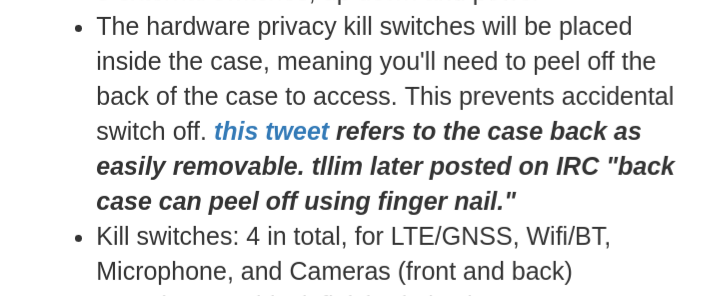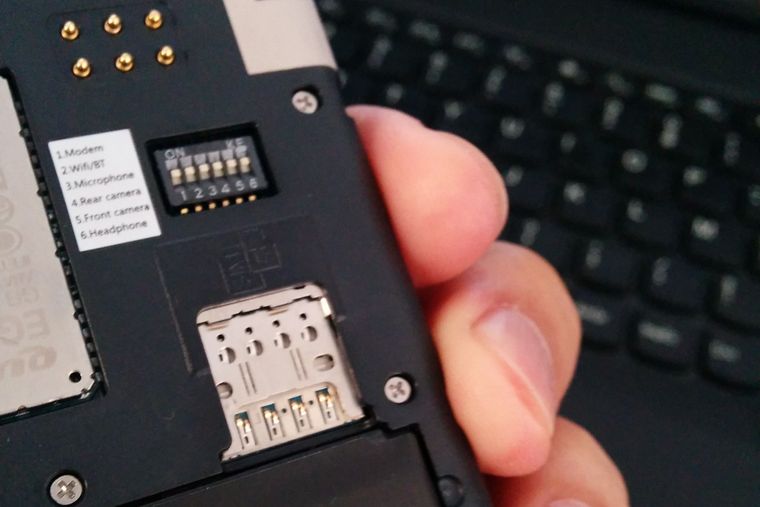-
@Flohack said in I trust this Covid19 tracking software...:
it has kill switches.
It's interesting.
Can you elaborate a little bit ? Thank you. -
@domubpkm Pinephone’s got kill switches that enable to mechanically stop some hardwares such as camera, Bluetooth, WiFi, Cellular Datas, etc... These switches are located beside (or under, not sure) the battery.
-
@stanwood yes

-
@domubpkm
In fact there are 6 of them.

This is a picture I took of my BH. The label on the left describes what they are for.
Sorry for the blur macro is bad with the phone's camera. -
@AppLee ok @trainailleur must be updated ?
-
The mobile world is sorely in need of some truly open hardware.

-
-
I guess that the above mentioned app concerns only the Americas. In Europe there is a separate approach under way to program an contact tracing app: https://www.pepp-pt.org/ (=Pan-European Privacy-Preserving Proximity Tracing (PEPP-PT))
Maybe it made sense if somebody contacts them about implementing this on ubuntu touch. (The contacts are on the site). -
@Vartojas If someone from the community is interested in this for UBtouch, this may be another link worth visiting [https://github.com/ito-org](link url). This project has some privacy advantages over PEPP-PT in that contacts from a positive tested person are matched locally on the devices by pull notification (not on a central server as with PEPP-PT).
-
Just to make things clear it seems possible to build an app that would be usefull for contact tracing concerning covid-19 (or any other future epidemic), without being at all a threat for privacy. And it is quite simple, and we can imagine many methods. Here is a simple example of a method:
-
Suppose that 2 nearby device can exchange messages wireless probably with bluetooth, but we could also imagine wifi in theory. (We should check that mac addresse are not a privacy problem, they should be regularly changed randomly.)
-
Whenever a nearby contact is made, between 2 devices, both devices generate a random string (RS) and exchange it with the neighboor. Both record in their local memory the locally-generated RS, and the remote received RS, and the corresponding date (not the time), and nothing else. It's kept only locally not sent to anybody else.
-
RS that are too old (>14 or 21 days) are automatically erased.
-
If someone is detected positive, with his approval, all RS remotely received are published anonymously in a central server, to alert people.
-
Now the person who generated a RS corresponding to a contact with an infected person can know he was in contact with an infected person (simply by consulting the public server and checking if one of its own RS is there or not). But only him can know, nobody else. And no private data is disclosed!
I really do hope things are going to go towards something like this, and if so that we could have a compatible app for Ubports.
-
-
Whaaaat... I switched to UBports to not get tracked by this big, profit and data hungry companies...
don't even think of a tracking app in any art and form. It will be used against you, it will be used to manipulate you, if they can they will, even if they say they wont.Those who would give up essential Liberty, to purchase a little temporary Safety, deserve neither Liberty nor Safety.
-
@magdesign I've actually switched to ubports from flip phones, I never used Android for privacy and freedom reasons. And I'm looking forward to getting rid of Android blobs, with pinephone and/or librem5.
But think of one thing: If you had a notebook in paper and every-time you approach someone you note his name in it, in case you have to warn people you where in contact with, in case you are sick. But none else than you have access to that notebook. Would you find this problematic?
The app I described, is basically that except that it is automatic, and more privacy-friendly, because I don't actually note the name of the person, but a random string that only the associated person knows it is associated to him.
And I guess privacy and freedom activists especially in the field of mobile phones, might have interest in being proactive and proposing solutions at the edge of privacy protection, rather than letting others propose solutions that are not so good for privacy.
-
Check this chart: https://www.visualcapitalist.com/history-of-pandemics-deadliest/
I am getting a bit offtopic, but: don't you trust the natural selection (do you really trust in digital solutions for every daily problem)? We all have to die when the time comes...However, waiting for my Librem5 since months/years

-
@magdesign
Yes yes I tend to agree that the we should not exaggerate gravity of covid-19. But this question of app is not only covid-19 but also any possible future epidemic. Imagine tomorrow we face a similar virus but it kills 50% of people infected, or worse 90%, would you really say we should not use such an app, even though it is harmless for privacy?Also it is always quite easy to say this kind of things about natural selection, when ourselves face a low probability of death (because we're young, that's my case, I guess it's yours), and others face a way higher probability. We might not say the same thing if we were facing death directly. And also it's not only a question of dying, but also dying in terrible conditions, if heath systems are overwhelmed. We have been habited not to face this anymore, these last decades.
And also do not forget that this app would not only save lives or give us security, but help us get back our freedoms, freedom to go out, and to meet people, while we are already confined.
-
The next big thing is to think about how much waste we create and how we destroy the earth and its ecosystem. Maybe create an app to track how much waste each person creates daily (including digital waste) and how many people will die because of this.
When writing a post like this one, how much energy is consumed until it shows on your screen... how many poor kids died for building the parts of your phone...
Sorry, I will stop it here, it does not fit into the UBports forum.
Lets talk about modern web-browser for UBports or about this cool own-mailbox.....
or about this cool own-mailbox..... -
For those who have the skills and energy to invest, in my opinion, Anbox is a very good investment! And truly now a priority for UT.
From then on, when Anbox will have become super reliable, fluid and for democratized use, everyone will be able to choose whether or not to install any invasive app on his private life, Covid or otherwise.
 .
. -
@domubpkm
Anbox is not a solution, native apps are a priority.
Anbox IMO is a statement that UT is not an OS worth investing in (creating native apps) but Android is because it is even compatible with UT.This message send users a wrong idea about UT and confinement make it hard for most APK to work properly on UT. So even with a super polished Anbox this won't satisfy most people who were promised a compatibility with android apps.
So Anbox won't keep its promises and UT will be promoting android. Bad and bad for us.
Anbox is good to have, but that's not something we should promote. -
Just to let you know that I changed my mind about this kind of app after reading this document (in french), showing many security problems inherent to any app like this:
-
@pparent
I asked about the chances of ever getting OpenSource drivers for modem etc., on the UBports Matrix channel, and got an informative response: the bandwidth and power is tight and - quite rightly - needs to be constrained. OpenSourcing the code would presumably make that unpoliceableI did wonder though... if chip producers could give the end user some confidence, by publishing the code, or by making it in some way ReadOnly.
(I fully realize how paranoid I sound : I just can't help but think that we're sleepwalking in Orwell's dystopia.
 )
)
